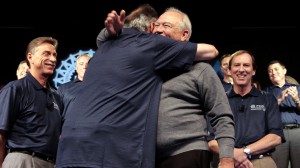
FCA Chief Executive Sergio Marchionne and UAW President Dennis Williams now have a reason to hug: an approved contract.
By a more than three-to-one margin, U.S. hourly workers approved their new contract with Fiat Chrysler. The news comes just weeks after the United Auto Workers Union threatened to strike when the rank-and-file rejected their original contract proposal by a margin nearly as large.
The four-year agreement includes signing bonuses and, among other things, creates a path for workers stuck in the hated second-tier category to sharply boost their own wages and benefits.
“The recent bargaining process that took place on behalf of our members at FCA is a testament to the UAW’s democratic values and commitment to our members,” UAW President Dennis Williams said in a statement formally confirming the results of the vote.
Where a number of major plants, including the big Jeep factory in Toledo, Ohio, rejected the original pact, the second settlement appears to have won pretty much uniform support – in part due to an aggressive push by UAW leaders. Pres. Williams acknowledged making mistakes in pitching the first contract, which was hammered out a few hours after the original deadline on September 14th.
Overall, 77% of Chrysler workers voted in favor of the new contract, a number matched by production workers. More elite skilled trades workers were a bit more skeptical but still voted 72% in favor, while the small FCA Salaried Bargaining Unit went 87% in support.
The frustration with the original agreement was strong and palpable from the start, and it seemed almost certain to fail. While there were skeptics, and some union activists tried to rally opposition the second round, momentum in favor of the new contract built quickly.
One reason was the creation of an eight-year path out of the universally unpopular two-tier system that locked new FCA hires into wages and benefits roughly half what veteran workers received.
Entry-level workers get an immediate signing bonus of $3,000 and their wages will jump from $15.78 to $19.28 an hour. That will climb to a minimum $22.50 by the end of the new contract, and $29 an hour in eight years or less. Workers on the second tier also will get more retirement security in this agreement, thanks to an increase in the company’s 401k contribution.
And based on the way the new contract has worked out, observers anticipate the UAW will press to banish the two-tier structure entirely when the two sides return to the bargaining table in 2019.
Veteran workers – those hired before 2007 – will get a $4,000 signing bonus, 3% raises in the first and third years of the contract, and 4% raises in the second and fourth years.
Another apparent selling point was the elimination of a plan that would have modified what experts describe as the “Cadillac of health care programs.” While UAW and FCA bargainers insisted the new approach was intended to hold down spiraling health care costs, not raise out-of-pocket expenses, workers didn’t buy in.
(UAW hires pr firm to curry favor for tentative deal with FCA. For more, Click Here.)
Among other things, the new FCA contract also eases back on a high-pressure scheduling system that meant line workers might immediately move from four 10-hour morning shifts to four more on the night shift.
The contract has a number of financial sweeteners, including one that boosts FCA’s profit-sharing program, traditionally weaker than those offered by either Ford or General Motors. It’s now tied to FCA’s North American profit margin, and will be paid out through a formula that is tied to the number of hours each worker clocks on the job.
“Our bargaining team was able to negotiate a contract which promises a secure future for our members, their families and their communities,” said Norwood Jewel, the head of the UAW’s Chrysler Department.
While there has been some concern from the financial community about the cost of the revised contract, FCA officials have quietly suggested it won’t hurt the bottom line much more than the original proposal.
(Click Here for details about the latest round of contract talks between UAW and FCA.)
“FCA US is pleased that UAW members have voted to ratify a new four-year national labor agreement,” the maker said in a Thursday statement. “This agreement represents an investment in our U.S. workforce and recognizes its contributions to the Company’s growth over the past six years.
“With the bargaining process now complete, the Company and our employees can look forward to continuing to build world class products, investing in our operations and achieving the targets set out in our five year business plan.”
The UAW began negotiating with each of Detroit’s Big Three in July. As it has done historically, it shifted focus to a single maker in the weeks before the mid-September deadline, hoping to come up with a more lucrative “pattern” contract that then could be bicycled over to the other domestic makers.
That’s all but certain to happen again this year, though Ford has so far insisted it will want a separate agreement reflecting its own unique needs and capabilities to pay for.
(To see more about Fiat Chrysler’s new Jeep plant in China, Click Here.)
General Motors took what seemed to be a well-timed move to improve relations with the UAW on Thursday by announcing it will add a second shift, doubling the size of the workforce at its big Detroit Hamtramck Assembly Plant. Known locally as the “Poletown Plant,” it produces an array of critical products, including the redesigned Chevrolet Volt plug-in and Malibu midsize sedan models. Cadillac will launch the new CT6 flagship sedan there early in 2016.
(Joe Szczesny contributed to this report.)
